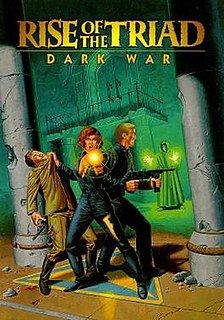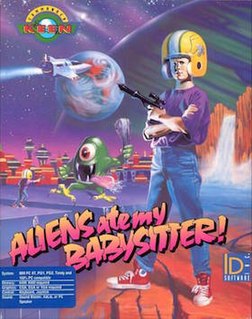| Look up apogee in Wiktionary, the free dictionary. |
Apogee is a type of apsis: an extreme point in an object's orbit.
Contents
Apogee may also refer to:
| Look up apogee in Wiktionary, the free dictionary. |
Apogee is a type of apsis: an extreme point in an object's orbit.
Apogee may also refer to:

Rise of the Triad: Dark War is a first-person shooter video game, developed and published by Apogee Software in 1995. The player can choose one of five different characters to play as, each bearing unique attributes such as height, speed, and endurance. Its remake was designed by Interceptor Entertainment and released by Apogee Games in 2013. The shareware version of the game is titled, Rise of the Triad: The HUNT Begins.

Wolfenstein 3D is a first-person shooter video game developed by id Software and published by Apogee Software and FormGen. Originally released on May 5, 1992 for DOS, it was inspired by the 1981 Muse Software video game Castle Wolfenstein, and is the third installment in the Wolfenstein series. In Wolfenstein 3D, the player assumes the role of Allied spy William "B.J." Blazkowicz during World War II as he escapes from the Nazi German prison Castle Wolfenstein and carries out a series of crucial missions against the Nazis. The player traverses each of the game's levels to find an elevator to the next level or kill a final boss, fighting Nazi soldiers, dogs, and other enemies with knives and a variety of guns.
Imagine may refer to:

Apogee Entertainment, formerly Apogee Software, LLC, is an American video game publisher based in Rowlett, Texas. The company was founded by Terry Nagy in 2008 after he acquired the rights to the name and logo from 3D Realms, which had used both previously.
An alias is an alternative name, such as a pseudonym.

3D Realms Entertainment ApS is a video game publisher based in Aalborg, Denmark. Scott Miller founded the company in his parents' home in Garland, Texas, United States, in 1987 as Apogee Software Productions, to release his game Kingdom of Kroz. In the 1980s and 1990s, the company popularized the shareware distribution model for video games and created successful game franchises, such as Duke Nukem. Apogee adopted the trading name 3D Realms in 1996; the "Apogee Software" name and logo were sold to Terry Nagy in 2008, using which he established Apogee Entertainment.
An adventure is an exciting experience that is typically bold, sometimes risky, undertaking.

Crystal Caves is a side-scrolling platform video game, developed and published by Apogee Software for IBM PC compatibles.

Wacky Wheels is an MS-DOS arcade kart racing video game released by Apogee Software in 1994. The game strongly resembles Super Mario Kart from the Super NES, but the karts are described as lawn mowers and the eight playable characters are animals from a zoo. It was released on GOG.com with support for Windows, Linux and macOS on August 20, 2014 and later released on Steam on May 6, 2015 as part of the 3D Realms Anthology.

Balls of Steel is a pinball computer game developed by Wildfire Studios and released on September 3, 1997. It is the only game to be published under the Pinball Wizards label, a division of Apogee Software.
Scott Miller is an American video game designer, programmer, and entrepreneur best known for founding Apogee Software, Ltd. in 1987. Starting with the Kroz series for MS-DOS from that year, Miller pioneered the concept of giving away the first game in a trilogy—distributed freely as shareware—with the opportunity to purchase the remaining two episodes. This method became the standard distribution method for Apogee. Competitors such as Epic MegaGames later adopted the same business model.
Dark Ages or Dark Age may refer to:
Transformers is a franchise centered on shapeshifting alien robots.

Commander Keen in Keen Dreams is a side-scrolling platform video game developed by id Software and published by Softdisk in 1991 for DOS. It is the fourth episode of the Commander Keen series. The game follows the titular Commander Keen, an eight-year-old child genius, in an adventure in his dreams as he journeys through a vegetable kingdom to defeat the evil potato king Boobus Tuber and free enslaved children from the Dream machine. The game features Keen running and jumping through various levels while opposed by various vegetable enemies; unlike the prior three episodes, Keen does not use a pogo stick to jump higher, and throws flower power pellets to temporarily turn enemies into flowers rather than shooting a raygun to kill them.
Lee Jackson is an American composer. He was the music and sound director for the video game developer 3D Realms from 1994 through 2002. He is most well known for his work on Duke Nukem 3D and Rise of the Triad, specifically for creating Duke Nukem 3D's main theme titled "Grabbag". He collaborated with Robert Prince to create the two games' instrumental background tracks. Jackson created all of the tracks for the fourth episode of Duke Nukem 3D, better known as the "Plutonium Pak Add-On" or as the full four-episode "Atomic Edition." In 2016, a remake and remaster called Duke Nukem 3D: 20th Anniversary World Tour was released, containing a new fifth episode by the original level designers, and containing new original music by Lee Jackson.
The video game Duke Nukem Forever spent fifteen years in development, from 1996 to 2011. It is a first-person shooter for PC, PlayStation 3 and Xbox 360, developed by 3D Realms, Triptych Games, Gearbox Software and Piranha Games. It is a sequel to the 1996 game Duke Nukem 3D, as part of the long-running Duke Nukem video game series. Intended to be groundbreaking, Duke Nukem Forever has become infamous in the video games industry and was considered vaporware due to its severely protracted development schedule; the game had been in development under 3D Realms since 1996. Director George Broussard, one of the creators of the original Duke Nukem game, announced the development in 1997, and promotional information for the game was released from 1997 until its release in 2011.

Commander Keen in Goodbye, Galaxy is a two-part episodic side-scrolling platform video game developed by id Software and published by Apogee Software in 1991 for DOS. It consists of the fifth and sixth episodes of the Commander Keen series, though they are numbered as the fourth and fifth, as Commander Keen in Keen Dreams is not part of the main continuity. The game follows the titular Commander Keen, an eight-year-old child genius, as he first journeys through the Shadowlands to rescue the Gnosticenes so they may ask the Oracle how the Shikadi plan to destroy the galaxy, and then through the Shikadi's Armageddon Machine to stop them. The two episodes feature Keen running, jumping, and shooting through various levels while opposed by aliens, robots, and other hazards.

Commander Keen in Aliens Ate My Babysitter is a side-scrolling platform video game developed by id Software and published by FormGen in December 1991 for DOS. It is the seventh episode of the Commander Keen series, though it is numbered as the sixth, as Commander Keen in Keen Dreams is outside of the main continuity. The game follows the titular Commander Keen, an eight-year-old child genius, as he journeys through an alien world to rescue his kidnapped babysitter. The game feature Keen running, jumping, and shooting through various levels while opposed by aliens, robots, and other hazards.